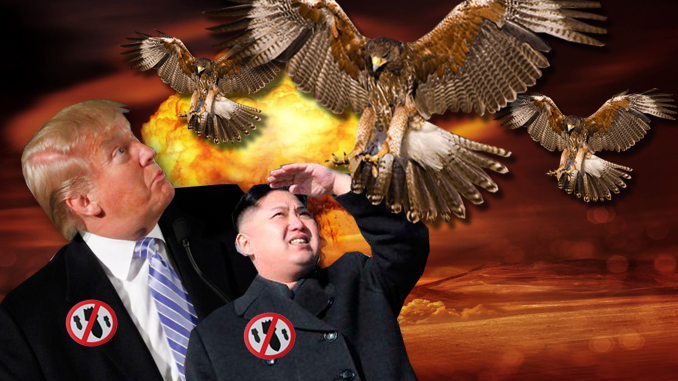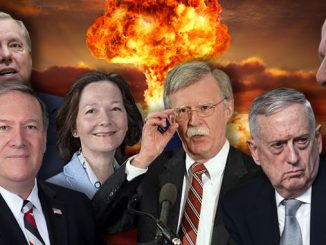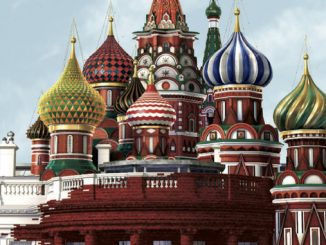
Warhawks, Democrats can’t tolerate president succeeding in peace efforts with “boogeyman”
By Dr. Ron Paul
President Donald Trump’s second summit with North Korean leader Kim Jong Un in late February was criticized by both parties in Washington long before Air Force One even touched down in Hanoi. Washington’s political class seemed terrified that the nearly 70-year state of “war” with North Korea might actually end. In the end the only positive thing they could say about the meeting was that Trump apparently walked away with nothing to show for it.
The location of the meeting—Hanoi, Vietnam— serves as a great example of what can be won in peace versus what is lost in war. After losing nearly 60,000 U.S. service members in an unnecessary war that took a million Vietnamese lives, the U.S. loss of the Vietnam War resulted not in a communist takeover of Southeast Asia but something very different: The domino theory failed because communism was destined to fail. Now we are close trading partners with an increasingly pro-market Vietnam. The result of trade and exchange versus war is a better life for all.
Unfortunately for Washington, the real lesson of Vietnam has not been learned. That is why the Republicans, Democrats, and the entire mainstream media spoke as one against Trump’s decision to take a bold step and actually meet again, one-on-one, with one of our “enemies” to see if we can avoid nuclear conflict.
One leading Democrat, House Intelligence Committee Chairman Adam Schiff (D-Calif), attacked Trump for meeting with Kim because speaking to the North Korean “gives him legitimacy.”
Does it make any sense that we should not even speak with our nuclear-armed adversaries because it gives them “legitimacy”? He’d rather have a nuclear war as long as Kim remains “illegitimate”? This is sadly the kind of thinking that prevails in Washington.
The media reported that Trump walked away from the meeting before the scheduled signing ceremony and closing press event. The talks broke down, it was reported, because Kim demanded an end to all sanctions before any reduction in North Korea’s nuclear arsenal. Washington sighed with relief and said, all together, “Better no deal than a bad deal.”
Meanwhile the North Koreans held a rare press conference clarifying that they only asked for partial sanctions relief in exchange for dismantling one of their main nuclear facilities. Further, press reports began to surface that National Security Advisor John Bolton threw additional demands on the table, which led Kim to draw the meeting to an early close.
Who’s telling the truth? We likely won’t know. But given Bolton’s strong opposition to any kind of peace agreement with North Korea it’s hard to doubt that he had something to do with the blowup of the summit. As The New York Times reported over the weekend, while Trump’s advisors were shocked when he decided to meet Kim face-to-face the first time for negotiations, Bolton wasn’t worried at all. As the Times writes, “Mr. Bolton told colleagues not to worry. The negotiations, he said, would collapse on their own.” And so they did.
Will Trump continue to allow his diplomatic efforts to be undermined by his own staff? Let’s hope the president will ignore Washington, ignore the neocons, and continue to work for peace with North Korea.
Ron Paul, a former U.S. representative from Texas and medical doctor, continues to write his weekly column for the Ron Paul Institute for Peace and Prosperity, online at www.ronpaulinstitute.org.
Summit Sticking Point
Did North Korea seek same secret nuclear status as Israel?
By Richard Walker
In the wake of the collapse of President Donald Trump’s Vietnam summit with North Korean leader Kim Jong Un, there were many unanswered questions, with both sides unwilling to claim victory.
There was, however, a secret issue discussed at the summit that Washington and Pyongyang prefer to remain secret for now, perhaps hoping to revisit it in the future. It was the possibility of North Korea being accorded the same nuclear status as Israel.
All this means that, from a public perspective, the event may go down in history as either a failed opportunity, the inevitable consequence of trying to negotiate with a rogue regime, or too much hype and serious miscalculations by Washington and Pyongyang.
Trump and “Chairman Kim,” as Trump calls the North Korean leader, both abandoned an expensive dinner and a conference scheduled for after the summit during which they had planned to stand together and announce to the world that they had solved the North Korean nuclear issue. Instead, Trump flew back to Washington on Air Force One, and Kim returned to Pyongyang on a lengthy train journey through China.
The South Koreans were left to wonder what had just happened. Essentially, they had been frozen out of the well-choreographed get-together of the two leaders, implying that they were minor players in a drama that directly affected them. It did not occur to the mass media to ask why South Korea was clearly sidelined. Could they have played a crucial role in the failed negotiations? We shall never know.
So what are we to make of what appeared to be this failure on a grand scale? President Trump has said he walked away because he could not get the right deal. One might be tempted to wonder why he had not anticipated failure before promising success with public outpouring of optimism before and during the summit. The White House later claimed that Kim had wanted all sanctions lifted, while refusing to commit to unfettered access to all his secret nuclear sites. Kim responded that Washington’s version of the breakdown of the talks was a lie and that he had not demanded the lifting of all sanctions.
The reality may be simpler than we think. It is entirely possible that Trump’s advisers, especially Secretary of State Mike Pompeo, National Security Advisor John Bolton, and political advisor Jared Kushner never briefed Trump fully about North Korea. They may not have pointed out that Kim, like his late father and grandfather, is a skilled tactician surrounded by generals with a long history of engagement with the West. Why, for example, would Kim give up his nuclear arsenal in exchange for the lifting of sanctions? He would have known what happened to Saddam Hussein and Muammar Qadaffi when they abandoned their nuclear ambitions.
Missing in mass media coverage was something a diplomat close to Moscow told AFP on condition of anonymity.
“The real secret of the talks was that Kim was prepared to offer access to all his nuclear sites and to end all nuclear activity, but he expected in return to keep his nukes and have North Korea recognized like Israel as a nuclear power. The U.S. would then have to remove its military components from South Korea, including nuclear weapons that Moscow and Beijing told Kim were stored in or near South Korea.”
According to this source, the issue that collapsed the summit was the demand for nuclear recognition, but this was something neither side wanted to explore publicly because it is something they hope to renegotiate in the months ahead.
“There was always an insurmountable hurdle when politicians resorted to terminology that means different things to different people,” the diplomat added. “For example, Americans see denuclearization as North Korea giving up all its nukes. North Koreans see it as the removal of America as a nuclear power from the Korean Peninsula.”
The source added that Moscow and Beijing continue to believe a deal is possible on recognizing North Korea as a nuclear power. The source suggested that Moscow had pushed this option privately with the Trump camp, knowing China approved it. China and Russia had secretly agreed that they could live with a nuclear North Korea that was properly monitored, provided the U.S. removed much of its hardware, especially nuclear weapons, from the region.
Where does it go from here? If Kim’s goal is to have his country accepted as a legitimate nuclear power like Israel, he might also feel it is achievable long term.
Trump could redefine denuclearization to mean that North Korea becomes a nuclear power monitored fully by Washington but ceases all nuclear weapons production, removes all its frontline military hardware pointed at South Korea, and does not object to an American military presence in the region.
Richard Walker is the nom de plume of a former New York mainstream news producer who grew tired of seeing his articles censored by his bosses.






I hope Ron Paul is right that President Trump will ‘continue to work for peace with North Korea’, his stated objective. We are already teetering on the edge of nuclear war: growing risk of confrontation with China in the South China Sea, plummeting relations with Russia and the prospect of a race to re-arm, a maelstrom in the Middle East that could escalate at any moment and the danger of unleashing a Latin American Spring over Venezuela – right on America’s doorstep that has the potential to create a real immigration problem of biblical proportions. Any bit of good news might give hope because the pattern of history is not encouraging.